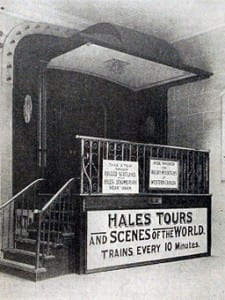Flickering, lost, forgotten: London’s silent picture palaces
By zclef78, on 10 June 2014
 Will you come with me to a talkie to-day?
Will you come with me to a talkie to-day?
During my second film event of the UCL Festival of the Arts in two days, I was transported back to the origins of cinema in London’s ‘filmland’. From the bright lights of Leicester Square to the back alleys of Soho, our group of fifteen retraced the steps of early twentieth-century film-goers through Bloomsbury and the West End.
There were a few familiar faces from the previous night’s event Memories of 60s Cinema-Going, all equally curious to discover the hidden stories behind these hitherto innocuous buildings dotted around London.
Led by Dr Chris O’Rourke (UCL Centre for Humanities Interdisciplinary Research Projects) who is researching the social experience of cinema-going in the period of silent film, we began in front of the brutish façade of the Odeon on Tottenham Court Road.
The birth of cinema in London, we were told, was Newman Street, 1894, where private demonstrations of peepshow kinetoscope machines showing a mixture of everyday and spectacular theatrical subjects were captivating 19th century audiences.
From these flickering beginnings, 500 cinemas opened in the London area. Tottenham Court Road alone was home to six including The Majestic Picturedrome, Carlton Cinema and The Court (not the pub) where The Dominion now stands. Somehow they were all commercially successful, just as today’s Starbucks and Costa manage inexplicably to sell enough Americanos to reside next to each other.
 Close
Close



